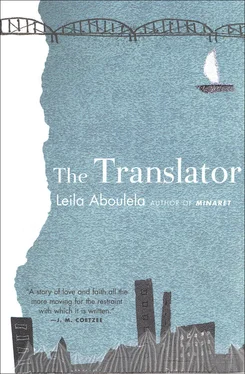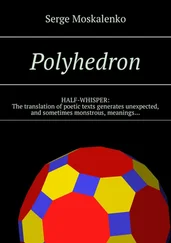Sammar nodded, parted Dalia’s hair in the middle and started to braid it. She could feel her aunt watching her. If she turned away now from Dalia’s hair and looked up at her aunt, she would meet her eyes, see the expression on them. Something like disappointment or disapproval, a kind of contempt. Many times when she met her aunt’s eyes she found that contempt when once, years ago, there was approval and love. ‘I love your mother more than I love you,’ she used to tease Tarig years ago. Another time, before the lines of defeat on Mahasen’s face, her faded eyes.
Sammar concentrated on Dalia’s hair and did not look up at her aunt. Even though the air cooler was blowing she still felt hot. She lifted her arm and with the sleeve of her blouse wiped the sweat that fell over her forehead.
‘Why are you so dishevelled today?’ Her aunt’s voice different than the chatter and music of the cartoon show.
‘I was with the children in the garden. They played with the pool. Nahla came over.’ Politeness required that she looked up. She lowered her eyes again.
‘Insha’ Allah they’re not going to have the wedding party in the house. Loud music and crowding the whole street.’
‘No, she told me they’re booking the Syrian club.’ She was going to add that Nahla was hoping Mahasen would attend, but decided against it.
‘I have no appetite for weddings or parties,’ her aunt said as if she could read her mind, ‘from the day they buried the deceased, I have no appetite for such things. Hanan goes, reluctantly, but it’s her duty to go. It’s expected of her.’
‘Yes,’ said Sammar. She did not like her aunt saying ‘the deceased’, never referring to Tarig by his name. It made him sound as if he was old when in reality he was young, forever young. Nor did she believe that Hanan went to parties ‘reluctantly’. But she kept silent as she finished Dalia’s hair and did not contradict her aunt, did not look up. Over the hum of the air cooler, over the music of the cartoon show, she heard from a distance the sunset azan. She had missed it in Aberdeen, felt its absence, sometimes fancied she heard it in the rumble of the central-heating pipes, in a sound coming from a neighbouring flat. It now came as a relief, the reminder that there was something bigger than all this, above everything. Allah akbar. Allah akbar…
She went to make wudu and had to tidy the bathroom first because the children had splashed the walls with water, thrown towels and wet clothes on the floor. In the bedroom she put on the ceiling fan and picked up the prayer mat that lay folded on her aunt’s bed. Sammar’s clothes and belongings were in a separate room which had locked cupboards and crates of Miranda, sacks of sugar and rice, but she slept in this room with her aunt and Amir. Electricity was too expensive to keep more than one air cooler going throughout the night. That was why they had to share the room, share the one air cooler. Sometimes there were power cuts during the night and the sudden silence of the air cooler would wake Sammar up. She would turn its switch to Off, because sometimes the surge of the power coming back was too strong and likely to damage the motor. Sometimes she fell asleep again in the remaining coolness of the room but minutes later the heat would wake her up. She would open all the windows but sometimes not even a breeze would enter the stifling room. Amir would toss and push the cover away from him, her aunt would sit up and lean against the wall, sighing curses at the government, the electricity company, life itself. And Sammar would get up and go outside, pace up and down the star-lit porch, unsteady from lack of sleep, stunned by the laden sky. In the past everyone had slept outdoors on the roof, wide-open space, a freshness even on the hottest nights. But Hanan had built her flat on the roof. ‘No one, Sammar,’ she said, ‘sleeps outdoors anymore.’ Because of mosquitoes bred by open drains and fumes of diesel rising during power cuts from bright houses that could afford generators.
After she prayed she went out to the garden. It was different without the children and she did not need her sunglasses now. She could have all the colours that she had missed in Aberdeen; yellow and brown, and everything else vivid. Flat land and a peaceful emptiness, space, no grey, no wind, no lines of granite. The sun had rimmed the houses down the road and left behind layers of pink and orange. In the east there was the confident blue of night, a flimsy moon, one, two, now three stars. Still the birds rushed to the trees, screeching, rustling the leaves, noisier than the children had been earlier on. On the other side of the road, the nightwatchman of the cooperative was serving his friends tea. They sat on the pavement on a large palm-fibre mat; prayer beads and laughter. Coals glowed, a kettle of water boiled and let off steam in the twilight. Her homesickness was cured, her eyes cooled by what she saw, the colours and how the sky was so much bigger than the world below, transparent. She heard the sound of a bell as the single, silly light of a bicycle lamp jerked down the pitted road. A cat cried out like a baby and everything without the wind had a smell; sand and jasmine bushes, torn eucalyptus leaves.
Her brother Waleed lived with his wife in a second-floor flat in one of the newer apartment blocks. They were newly married and both worked for the same architecture office. Sammar parked Hanan’s car under the dim yellow glow of a street lamp. The driving lessons she had taken in Aberdeen had come in useful after all, though at first the change to driving on the right was difficult. Amir and Dalia opened the car door and jumped out. ‘If we were in Scotland,’ she said to them as they crossed the road, ‘you would have had to sit in the back and wear seat-belts.’ What she said made no sense to them. They had never seen anyone wear a seat-belt; they could not imagine a place far away called Scotland.
The road they walked across was pitted with potholes, strewn with rubble from the new buildings. Bricks and scattering of cement were everywhere, the playthings of children who lived on the streets. There was a small canteen next to the building and some of the children were crowded near the entrance. They were in torn stained clothes, bare feet covered with dust up to their ankles. They wanted lollipops and gum, and were laughing and jostling each other, their teeth bright white in the poorly lit street. And though Sammar had come back from rain and a rich city of the First World, the meagerness of this place was familiar. Shabbiness as if the sun had burned away the lushness of life and left no room for luxuries or lies.
As soon as Waleed opened the door for them, the power failed. There was much confusion in the sudden dark with Amir jumping about in a state of great excitement, laughing and calling Dalia names because she was afraid. There was a fumble for candles and a torch, attempts to soothe Dalia, a joke about Sammar cutting off the electricity, bringing in the darkness with her.
Waleed led them through the flat and out to sit on the balcony. This pleased the children who started to pester the pigeons asleep inside a large crate caged with mesh. They stuck their fingers through the holes in the mesh, trying to reach the pigeons. All the neighbouring houses and roads were in darkness, proof of a major power cut and not a fault in the building. Only far away shone the lights of the airport, yellow and red. In the canteen below, someone lit a hurricane lamp and a shout in the street was answered by laughter. There was enough light from the moon and the stars for Sammar to see her brother clearly, the jellabia he was wearing, the large gap between his teeth when he smiled. He said that his wife had gone to her German lesson.
Читать дальше












